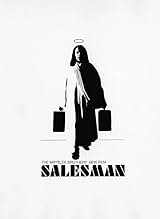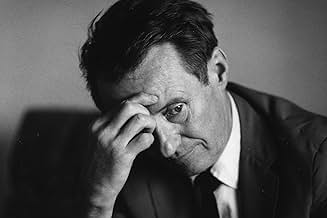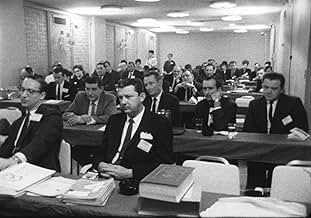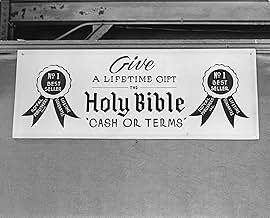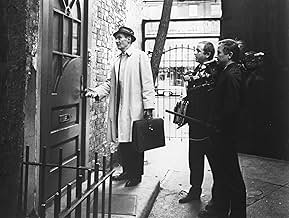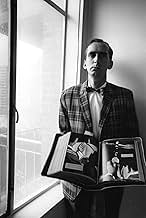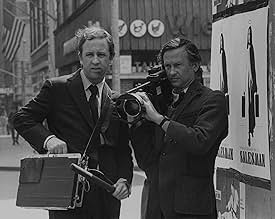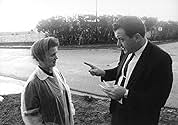VALUTAZIONE IMDb
7,6/10
6003
LA TUA VALUTAZIONE
Quattro ostinati venditori di bibbie porta a porta viaggiano da Boston alla Florida in un'impresa apparentemente inutile per vendere edizioni di lusso del Buon Libro ai cattolici della class... Leggi tuttoQuattro ostinati venditori di bibbie porta a porta viaggiano da Boston alla Florida in un'impresa apparentemente inutile per vendere edizioni di lusso del Buon Libro ai cattolici della classe operaia.Quattro ostinati venditori di bibbie porta a porta viaggiano da Boston alla Florida in un'impresa apparentemente inutile per vendere edizioni di lusso del Buon Libro ai cattolici della classe operaia.
- Premi
- 4 vittorie totali
Recensioni in evidenza
Documentaries are a fairly pervasive genre in today's culture, and an increasing trend is to manipulate the footage in order to further the authentication of one's thesis. Albert and David Maysles' 1969 documentary 'Salesman' however, turns an unflinching eye on its' subjects, sometimes with unnerving and disturbing results.
'Salesman' follows four door-to-door high-end bible salesmen as they travel around the country. The four men have nicknames they've given each other, all describing their sales approach: The Rabbit, The Badger, The Gipper and The Bull. We hear most from The Badger (Paul Brennan) as he takes his leads and tries to pull himself out of a sales slump. The leads that most of the salesmen follow end up being poor Catholic families who can't even afford a dollar a week payment, but are at times talked into it anyway by the sales tactics these men employ.
The Maysles give us an absolutely fascinating look at the world of door-to-door sales, but it is also a disturbing door to open. The pressure that the salesmen use when trying to sell the product, and the struggle that the prospects exhibit, is difficult to watch. In one scene, Brennan goes to the door of a recent customer to pick up their down payment for another of the salesmen and pretty much refuses to take 'No' for an answer, telling her that he's the salesman's boss and is going to have to dock him a fee if she cancels the sale, eventually guilting this family who clearly cannot take on another installment payment into going on with the sale. On the other hand, we also see sales meetings where the pressure is turned on the salesmen themselves, so it's clear that the threats of unemployment are a definite motivator.
I wondered throughout the film if David Mamet had seen this film and subsequently used it as inspiration for 'Glengarry Glen Ross'. From the sales meeting where the manager threatens the salesmen to the characters themselves, I saw several clear comparisons. Brennan is Lemmon's 'Shel' character to a tee, and I subsequently couldn't help chuckling at the image of The Simpsons' character 'Gil'. Whatever specific inspiration 'Salesman' has provided, it is clearly an important film that does not soften its edges. 7/10
'Salesman' follows four door-to-door high-end bible salesmen as they travel around the country. The four men have nicknames they've given each other, all describing their sales approach: The Rabbit, The Badger, The Gipper and The Bull. We hear most from The Badger (Paul Brennan) as he takes his leads and tries to pull himself out of a sales slump. The leads that most of the salesmen follow end up being poor Catholic families who can't even afford a dollar a week payment, but are at times talked into it anyway by the sales tactics these men employ.
The Maysles give us an absolutely fascinating look at the world of door-to-door sales, but it is also a disturbing door to open. The pressure that the salesmen use when trying to sell the product, and the struggle that the prospects exhibit, is difficult to watch. In one scene, Brennan goes to the door of a recent customer to pick up their down payment for another of the salesmen and pretty much refuses to take 'No' for an answer, telling her that he's the salesman's boss and is going to have to dock him a fee if she cancels the sale, eventually guilting this family who clearly cannot take on another installment payment into going on with the sale. On the other hand, we also see sales meetings where the pressure is turned on the salesmen themselves, so it's clear that the threats of unemployment are a definite motivator.
I wondered throughout the film if David Mamet had seen this film and subsequently used it as inspiration for 'Glengarry Glen Ross'. From the sales meeting where the manager threatens the salesmen to the characters themselves, I saw several clear comparisons. Brennan is Lemmon's 'Shel' character to a tee, and I subsequently couldn't help chuckling at the image of The Simpsons' character 'Gil'. Whatever specific inspiration 'Salesman' has provided, it is clearly an important film that does not soften its edges. 7/10
"Salesman" documents the activities of Bible salesmen as they go on the road to sell their wares to "leads" garnered from Catholic churches. It's a tough life, especially when many prospects cannot afford the cost of these illustrated Bibles.
It is difficult not to compare this film to Mamet's "Glengarry Glen Ross". It details the hardships and humiliations of men who earn their egos through sales. Anyone who has ever sold a product door to door can relate to this film.
The transparent sales techniques. The smug sales aphorisms. The roller-coaster ride from day to day. It is all there.
It is easy to draw conclusions or morals from this documentary. The most obvious refers to the soul-sucking depression that comes from spending your life doing something you do not enjoy or believe in.
As a time capsule of life in the late 60s, the film is enjoyable. Seeing everyone smoking cigarettes nonstop, for example, is a reminder of how things have changed.
It is difficult not to compare this film to Mamet's "Glengarry Glen Ross". It details the hardships and humiliations of men who earn their egos through sales. Anyone who has ever sold a product door to door can relate to this film.
The transparent sales techniques. The smug sales aphorisms. The roller-coaster ride from day to day. It is all there.
It is easy to draw conclusions or morals from this documentary. The most obvious refers to the soul-sucking depression that comes from spending your life doing something you do not enjoy or believe in.
As a time capsule of life in the late 60s, the film is enjoyable. Seeing everyone smoking cigarettes nonstop, for example, is a reminder of how things have changed.
The camera follows four Bible salesmen as they follow up on names of Catholic parishioners in Boston and then Florida.
I can understand that the documentary is not for all tastes. There's really no narrative, while we know next to nothing about the four principals. Yet, the results, to me at least, are fascinating, if not entertaining. The four Bible salesmen are a harried crew, near the bottom of a commercial food chain. Pressure to sell goes from ownership to management to salesmen, and finally to prospective customers to buy. And throughout, the camera never wavers, at times lingering over a face in rather enigmatic fashion. Nor do the subjects ever acknowledge camera's presence-- quite a cinematic accomplishment. Importantly, these are ordinary faces, certainly not the Hollywood variety.
To me, the most interesting part are the working class customers. They can barely pay the bills they already have, let alone fork over an extra dollar a week. I'm guessing Badger's burnout comes from years of hustling people who should not be hustled. Of course, the pitch revolves around having a Bible with illustrations that will confirm a Catholic's faith and enrich their lives. I'm supposing the salesmen have to believe that at some level, otherwise how could they continue to pressure poor people to buy. And catch the ride by the ritzy Miami Beach hotels, right before the guys start knocking on wear-worn doors.
Overall, this is quite a remarkable 85-minutes, like nothing else I've seen. I'm not sure what to make of the result, that is, whether there's an intended point beyond the momentary. But either way, the unvarnished glimpses the film provides are definitely memorable.
I can understand that the documentary is not for all tastes. There's really no narrative, while we know next to nothing about the four principals. Yet, the results, to me at least, are fascinating, if not entertaining. The four Bible salesmen are a harried crew, near the bottom of a commercial food chain. Pressure to sell goes from ownership to management to salesmen, and finally to prospective customers to buy. And throughout, the camera never wavers, at times lingering over a face in rather enigmatic fashion. Nor do the subjects ever acknowledge camera's presence-- quite a cinematic accomplishment. Importantly, these are ordinary faces, certainly not the Hollywood variety.
To me, the most interesting part are the working class customers. They can barely pay the bills they already have, let alone fork over an extra dollar a week. I'm guessing Badger's burnout comes from years of hustling people who should not be hustled. Of course, the pitch revolves around having a Bible with illustrations that will confirm a Catholic's faith and enrich their lives. I'm supposing the salesmen have to believe that at some level, otherwise how could they continue to pressure poor people to buy. And catch the ride by the ritzy Miami Beach hotels, right before the guys start knocking on wear-worn doors.
Overall, this is quite a remarkable 85-minutes, like nothing else I've seen. I'm not sure what to make of the result, that is, whether there's an intended point beyond the momentary. But either way, the unvarnished glimpses the film provides are definitely memorable.
Paul Brennan is "The Badger". Charles McDevitt is "The Gipper". James Baker is "The Rabbit" and Raymond Martos is "The Bull". However this is not yet another British gangster film from Guy Ritchie but rather a fly-on-the-wall documentary following these four door-to-door bible salesman as they go about their trade and shoot the breeze with one another. Selling for as much as $40 per ornate book, the target audience are mostly poor catholic families who are given a hard sell before being offered a range of payment methods. In the middle of a sales slum, we follow Paul Brennan as he tries to break his losing streak.
Probably the worst job I have done wasn't that bad but was when I was a cleaner 7 mornings a week while also going through university. It felt worse because I also worked weekend evenings in a bar. However I would happily do either of those again if the only other option open to me was telephone or door-to-door sales because to me it is a soul-destroying job. I know some people can excel at it but others scrape by on their commissions, trying to force products onto others that they wouldn't buy themselves. This documentary confirms my thoughts on the job as we follow Paul Brennan on sales calls, conferences and sales meetings. Those familiar with Glengary Glenross will know where they are already and personally I kept seeing Brennan as the Gill character from the Simpsons, frantically just trying to get by. The film doesn't provide much more insight than that because it is very much a fly-on-the-wall affair that lets the characters speak for themselves.
By doing this it lays bare the approach of the sales game. It is depressing for several reasons and it made me feel sympathy for Brennan as often as I felt repulsed by him. He doesn't care about those he is selling to and he lies, applies pressure and guilts his marks into buying something they don't need and often don't actually want. But it is easy to feel for him because he is doing a job. I have never had someone coming door-to-door astonish me with a service or product that I suddenly wanted, especially nowadays, if you want it and can afford it, you probably already have it, but the sales staff still need to sell and Brennan's way is the most basic approach. The Maysles brothers wisely stay out of the way and I was quite amazed at how unobtrusive their camera was even when the sales were in relatively confined rooms.
Overall this is a rather depressing film that could have had more in the way of insight but does well to stand back and just observe. Modern documentaries often lose that so in a way it was refreshing not to have talking heads throughout the footage. Could have been more then but the cold look at the sales business, the sellers and the potential buyers is well done and makes for engaging if rather downbeat entertainment.
Probably the worst job I have done wasn't that bad but was when I was a cleaner 7 mornings a week while also going through university. It felt worse because I also worked weekend evenings in a bar. However I would happily do either of those again if the only other option open to me was telephone or door-to-door sales because to me it is a soul-destroying job. I know some people can excel at it but others scrape by on their commissions, trying to force products onto others that they wouldn't buy themselves. This documentary confirms my thoughts on the job as we follow Paul Brennan on sales calls, conferences and sales meetings. Those familiar with Glengary Glenross will know where they are already and personally I kept seeing Brennan as the Gill character from the Simpsons, frantically just trying to get by. The film doesn't provide much more insight than that because it is very much a fly-on-the-wall affair that lets the characters speak for themselves.
By doing this it lays bare the approach of the sales game. It is depressing for several reasons and it made me feel sympathy for Brennan as often as I felt repulsed by him. He doesn't care about those he is selling to and he lies, applies pressure and guilts his marks into buying something they don't need and often don't actually want. But it is easy to feel for him because he is doing a job. I have never had someone coming door-to-door astonish me with a service or product that I suddenly wanted, especially nowadays, if you want it and can afford it, you probably already have it, but the sales staff still need to sell and Brennan's way is the most basic approach. The Maysles brothers wisely stay out of the way and I was quite amazed at how unobtrusive their camera was even when the sales were in relatively confined rooms.
Overall this is a rather depressing film that could have had more in the way of insight but does well to stand back and just observe. Modern documentaries often lose that so in a way it was refreshing not to have talking heads throughout the footage. Could have been more then but the cold look at the sales business, the sellers and the potential buyers is well done and makes for engaging if rather downbeat entertainment.
As with Frederick Wiseman's "Titicut Follies," the Maysles brothers' "Salesman" is truly a landmark for the "cinema verite" documentary movement of the 1960s. Although the former is shockingly realistic in a sensational way, "Salesman" is actually the more disturbing for showing the Hell-on-earth that marks the workaday world for most of humanity. If ever a film shows that most people "lead lives of quiet desperation," this is it. In my lifetime of viewing films, I've never seen a non-fiction film more affecting and poignant. That this film didn't make the AFI Top 100 is practically scandalous. Be forewarned, this is an oppressively sad, yet slyly funny, film that is not easy to watch. It speaks volumes about American business practices, the ties between business and organized religion, the exploitation of religious belief (and its perversion via materialism), the dehumanization of workers, the crushing wisdom that can come with aging, the scary mindset of suburban denizens, and a lot more. If ever anyone had the right to ask the question, "Is that all there is?" it would be Paul, an aging Bible salesman having trouble meeting his sales quota, who serves as the film's central character. The film is brutally honest, yet powerfully manipulative. It does beg the question: how much is real and how much is affected by the presence of the cameras? One does feel, after seeing this, that reality is just as bad as Dorothy Parker said it was. For those who fail, the American Dream is a nightmare. In short, a film you'll never forget.
Lo sapevi?
- Quiz49.95 U.S. Dollars (which is what the Bibles sold by the salesmen cost in 1965-66, the time of the movie) is the equivalent of about $500 in 2025.
- ConnessioniFeatured in Camera Three: Direct Cinema: Part 1 (1969)
I più visti
Accedi per valutare e creare un elenco di titoli salvati per ottenere consigli personalizzati
- How long is Salesman?Powered by Alexa
Dettagli
- Data di uscita
- Paese di origine
- Siti ufficiali
- Lingua
- Celebre anche come
- Seyyar Satıcı
- Luoghi delle riprese
- Auburn, Massachusetts, Stati Uniti(The Yankee Drummer Inn)
- Azienda produttrice
- Vedi altri crediti dell’azienda su IMDbPro
Botteghino
- Budget
- 105.000 USD (previsto)
- Tempo di esecuzione1 ora 31 minuti
- Colore
- Mix di suoni
- Proporzioni
- 1.37 : 1
Contribuisci a questa pagina
Suggerisci una modifica o aggiungi i contenuti mancanti



